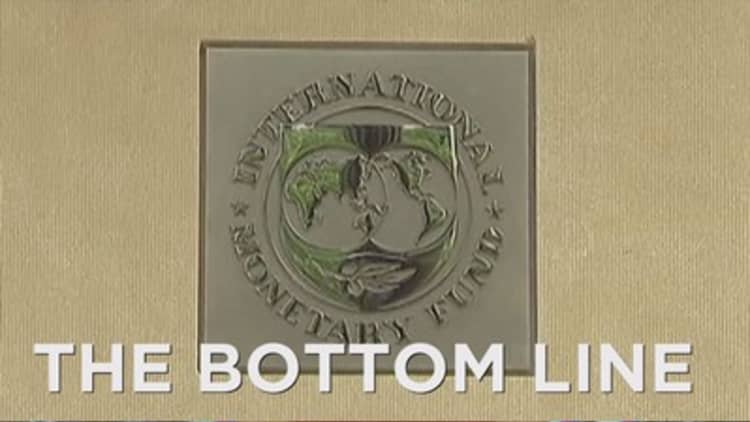
The euro has climbed 4 percent against the dollar this month – a move that might be viewed as out of kilter with events in the euro area, where Greece looks to be lurching ever closer to a debt default.
While the euro's rise to a one-month peak versus the dollar on Thursday is linked to dollar weakness after this week's dovish Federal Reserve statement, analysts said it's hard to deny that the euro is proving resilient in the face of a Greek crisis.
"Euro/dollar has been going up since mid-March. That basically tells you that the market is taking the view that Greece is not that relevant for the euro," Vasileios Gkionakis, head of global currency strategy at Unicredit, told CNBC's "Squawk Box Europe" on Thursday.
Read MoreBarring miracle, no Greece deal expected
The single currency rose as high as $1.14 on Thursday, up more than 8 percent from a 12-year low just below the $1.05 hit in March.

That move comes against a backdrop of fading expectations that Greece and its international creditors will reach a deal to prevent Greece from defaulting on its debt at the end of the month.
Euro zone finance ministers are due to meet later Thursday and Friday, but expectations of a breakthrough in talks are low.
"Many analysts have been perplexed by the move in the euro and there are some interesting theories. One is that the yields (on government bonds) in the euro zone have risen, making the euro attractive relative to the dollar," Boris Schlossberg, managing director at BK Asset Management in New York, told CNBC on Wednesday.
"Second, the spin out of Greece from the euro zone is not going to be a big material event."
A debt default does not necessarily mean that Greece would leave the euro area, but it does raise that risk, according to analysts.
Read More Greece's Tsipras heads to Russia for some love
"The market is being complacent about that and we don't know what the ramifications will be, but the underlying basis here is that the market is unconcerned about Greece leaving," said Schlossberg. "The notion here is that if Greece leaves, it's like bad debt off your books, and is actually positive for the euro."
Safe-haven traits
Jane Foley, senior currency strategist at Rabobank in London, offers another reason for the euro's rebound against the dollar – the single currency is still down almost 6 percent against the greenback in the year-to-date.
The euro zone's current-account surplus is encouraging nervous investors to pile their money back into region, putting upward pressure on the euro, Foley said.
"If you think about how currencies of current account regions behave, we often see them coming home in times of crisis – look at how the yen behaved after the nuclear disaster a few years ago," Foley told CNBC.
"And therefore, while it would be a step too far to say that the euro is a safe haven, it is capable of exhibiting safe-haven behaviour under certain circumstances and I think that is because of its current account surplus."
According to the European Central Bank, the euro zone current account surplus stood at 18.6 billion euros ($21.2 billion) in March, and Foley noted that while this was well below the 30.5-billion-euro surplus seen at the start of the year, it was still sizeable.


